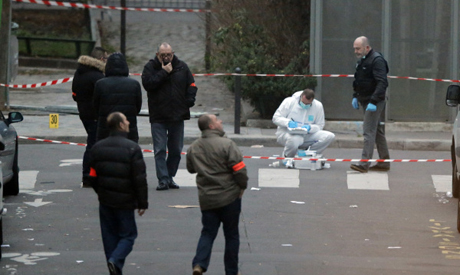
French forensic experts and police officers examine evidence outside the office of French satirical newspaper Charlie Hebdo in Paris, Wednesday, Jan. 7, 2015. (Photo: Reuters)
Egypt's Journalists Syndicate and Al-Azhar, Sunni Islam's most prestigious centre of learning, say the assailants who staged Wednesday's attack on the French cartoon magazine Charlie Hebdo do not represent Islam, labeling the deadly assault "criminal".
"On behalf of all Egyptian journalists we present our condolences to all the victims' families in that horrifying attack," said a statement published by the Journalists Syndicate Wednesday afternoon. "Those attackers can not belong to any religion, especially Islam. They are only savage killers," said the statement.
At least 12 people, mostly journalists, were killed in Paris when gunmen opened fire on them.
The Journalists Syndicate added that the battle to fight fascists and terrorists on all levels was not a single nation's battle, but rather humanity's battle.
Al-Azhar, meanwhile, denounced the incident as a "criminal attack," saying that "Islam denounces any violence," according to Egypt's state news agency MENA.
For his part, Egyptian Foreign Minister Sameh Shoukry expressed his country's support for France against terrorism.
Charlie Hebdo (Charlie Weekly) is renowned for courting controversy with satirical attacks on political and religious leaders and has published numerous cartoons lampooning the Prophet Mohammad.
The last tweet on its Twitter account mocked Abu Bakr Al-Baghdadi, the leader of the militant Islamic State, which has taken control of large swathes of Iraq and Syria.
A firebomb attack gutted the headquarters of Charlie Hebdo in November 2011 after it put an image of the Prophet Mohammad on its cover in what it described as a Shariah edition.
Content mocking Islam saw violent reactions from Islamist groups on different occasions.
In 2012, Christopher Stevens, then US ambassador to Libya, and three other embassy staff were killed during an attack on the US Consulate in Benghazi that came after an anti-Islam film was released online.
In early 2006, cartoons published by a Danish newspaper led to protests across the Arab and Islamic world, with some turning to violence resulting in more than 200 reported deaths.
Short link: